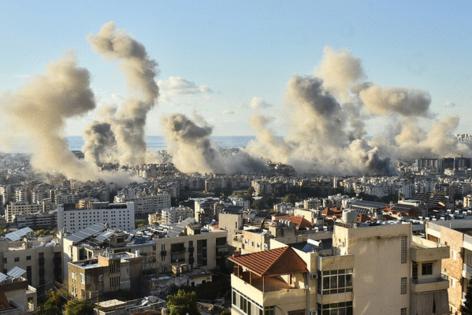Israel deliberates cease-fire to end ongoing bombing of Lebanon
Published in News & Features
Israel’s security cabinet began deliberating a cease-fire with Lebanon-based Hezbollah, according to an Israeli official, even as the air force conducted simultaneous heavy strikes on Beirut.
The meeting of Prime Minister Benjamin Netanyahu’s top coalition members started Tuesday afternoon, said the official, with a vote likely to take place later on a U.S.-drafted proposal. If they approve the plan without calling for significant changes — which would require Hezbollah’s consent — a 60-day cease-fire could potentially start immediately.
Oil and gold prices have fallen this week, with traders optimistic a truce would help calm the Middle East. The Israeli shekel’s also strengthened.
The talks are taking place after Israel said eight of its warplanes struck 20 Hezbollah targets in the southern suburbs of Beirut, in one of its most intense bombardments of the city to date. The military earlier asked residents in several buildings to leave immediately, and plumes of smoke were seen rising from many locations.
Hezbollah fired projectiles into Israel and sirens sounded in northern areas of the country, including the city of Haifa.
One of the security cabinet’s roughly 10 members, National Security Minister Itamar Ben-Gvir, is opposed to a deal, arguing that Israel should continue its military campaign and crush Hezbollah. Some mayors of northern Israeli towns devastated by rocket and drone salvos from the Iranian-backed group over the past 13 months have made similar comments.
Still, it’s likely Netanyahu can get approval for a deal even without the support of Ben-Gvir.
The full agreement hasn’t been made public. Broadly, it says Hezbollah fighters must retreat north of the Litani River, about 30 kilometers (19 miles) away from the Israeli border. The Lebanese army, which is separate from Hezbollah, will deploy more forces in the south of the country to beef up a contingent of United Nations peacekeepers, helping to ensure the militant group doesn’t operate there.
The Israel Defense Forces earlier said its troops had reached the Litani, about two months after they began a ground incursion of Lebanon.
Israel has insisted on being able to strike Hezbollah positions if it deems the organization is breaching the cease-fire terms. The Lebanese government and Hezbollah have said they won’t accept that. It’s unclear how the proposal squares those positions.
Lebanon’s Prime Minister Najib Mikati is expected to speak on Tuesday evening to confirm the country’s approval of a cease-fire following an Israeli announcement, according to Lebanese media.
Sharren Haskel, Israel’s deputy foreign minister, who’s not a security cabinet member, said the process of implementing a truce would become clear only after a vote.
“It is a very sensitive time,” she told reporters ahead of the meeting. “There needs to be a discussion. There might be a vote as well. And on whether and how this will be conducted, then we will know the rest of the process as well.”
Around 2,500 people have been killed in Lebanon by Israeli strikes and the ground offensive in the past two months, while 1.2 million — more than a fifth of the population — have been displaced. About 50 Israeli troops have been killed in combat in southern Lebanon.
Israel and Hezbollah have been in conflict since the latter began striking Israeli territory in October 2023 in solidarity with Hamas. Both Hezbollah and Hamas, which triggered the ongoing war in Gaza with its attack on southern Israel, are designated as terrorist organizations by the U.S. and many other countries.
Talks between Israel and Hamas over a cease-fire in Gaza have stalled for months. Though the conflicts are connected, there’s little sign a deal over Lebanon would increase the chances of a truce in Gaza.
©2024 Bloomberg L.P. Visit bloomberg.com. Distributed by Tribune Content Agency, LLC.







Comments